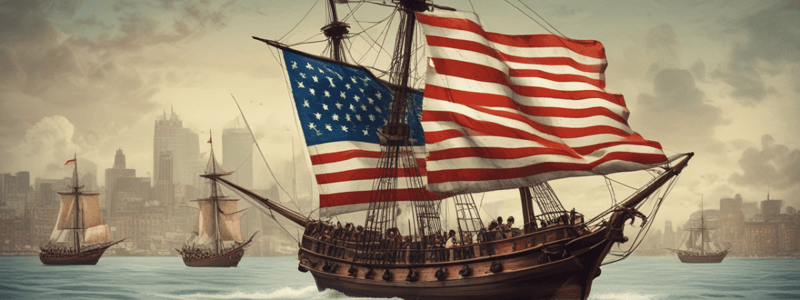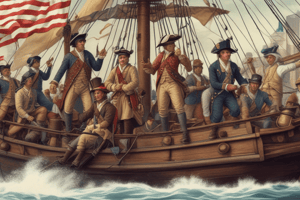Podcast
Questions and Answers
Why did the American colonists feel upset in 1773?
Why did the American colonists feel upset in 1773?
- Because they wanted to start a war with Britain
- Because they didn't like the taste of tea
- Because the British government taxed their tea unfairly (correct)
- Because they didn't have enough money to buy tea
What was the main reason behind the Boston Tea Party?
What was the main reason behind the Boston Tea Party?
- To show support for the British government
- To start a fight with the British soldiers
- To steal tea from the ships
- To protest the British tax on tea (correct)
What was the outcome of the growing tension between Britain and America?
What was the outcome of the growing tension between Britain and America?
- The American colonists paid the tea tax quietly
- The American colonists started a war with France
- The British government lowered the tea tax
- The Revolutionary War began in 1775 (correct)
What is a tax, according to the content?
What is a tax, according to the content?
Why did the British government give the British East India Company special privileges?
Why did the British government give the British East India Company special privileges?
What did the colonists feel they lacked in the British government?
What did the colonists feel they lacked in the British government?
What was the name of the group of colonists that planned the Boston Tea Party?
What was the name of the group of colonists that planned the Boston Tea Party?
What was the main action taken by the men dressed as Mohawk Indians on December 16th, 1773?
What was the main action taken by the men dressed as Mohawk Indians on December 16th, 1773?
Why did the British government create laws to punish the colonists?
Why did the British government create laws to punish the colonists?
What was the impact of closing the port in Boston?
What was the impact of closing the port in Boston?
What was the outcome of the tension between the Americans and the British?
What was the outcome of the tension between the Americans and the British?
How long after the Boston Tea Party did the Revolutionary War start?
How long after the Boston Tea Party did the Revolutionary War start?
What was the main motivation of the Americans after the Boston Tea Party?
What was the main motivation of the Americans after the Boston Tea Party?
Why did the men dress up as Mohawk Indians during the Boston Tea Party?
Why did the men dress up as Mohawk Indians during the Boston Tea Party?
What was the significance of the Boston Tea Party?
What was the significance of the Boston Tea Party?
Flashcards are hidden until you start studying
Study Notes
The Boston Tea Party
- American colonists felt unfairly treated by the British government, which led to the Boston Tea Party in 1773.
- The British government imposed a tax on tea, which the colonists felt was unfair because they had no voice in the government.
- The tax was seen as "taxation without representation".
Background
- Before the Revolutionary War, America was ruled by Britain and colonists paid taxes to Britain.
- Colonists understood that some taxes were necessary, but felt the tea tax was unfair.
- The British government gave the British East India Company special selling privileges, which hurt American merchants.
The Raid
- On December 16th, 1773, a group of angry colonists, calling themselves the Sons of Liberty, dressed up as Mohawk Indians and snuck onto three British-controlled cargo ships in Boston Harbor.
- They grabbed about 340 chests full of tea and dumped them into the water to protest the tea tax.
Consequences
- The British government was angered by the act and created laws to punish the colonists.
- These laws made life in Boston hard and even closed the port where ships normally loaded and unloaded cargo.
- Closing the port created a financial hardship for many people living in Boston.
Significance
- The Boston Tea Party fueled the growing tension between Britain and America, ultimately leading to the Revolutionary War in 1775.
- The Revolutionary War led to America winning its independence from Britain.
Studying That Suits You
Use AI to generate personalized quizzes and flashcards to suit your learning preferences.




